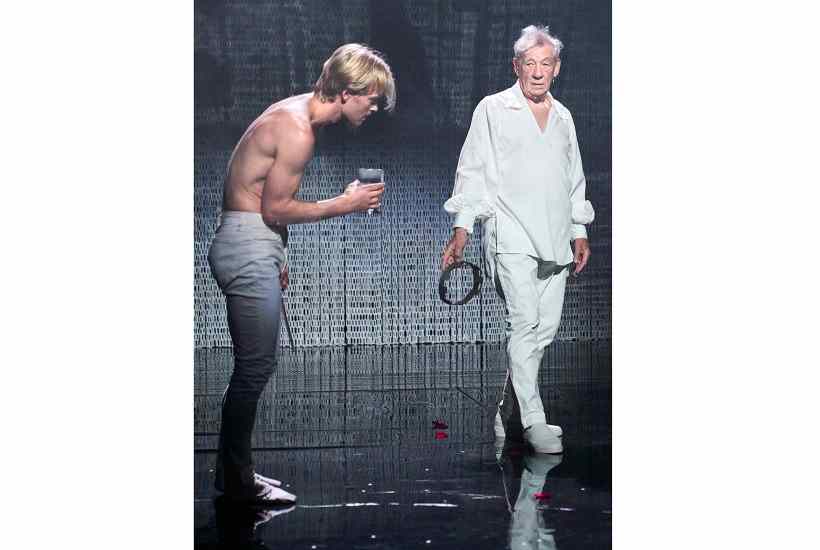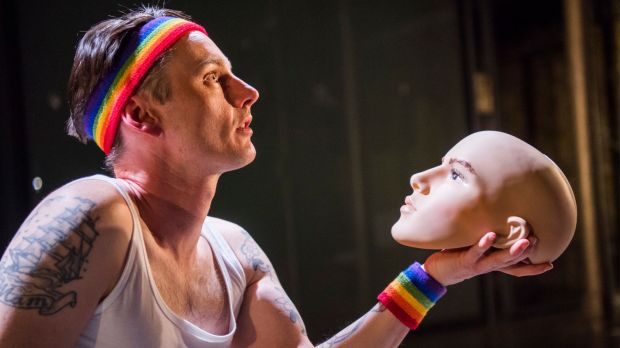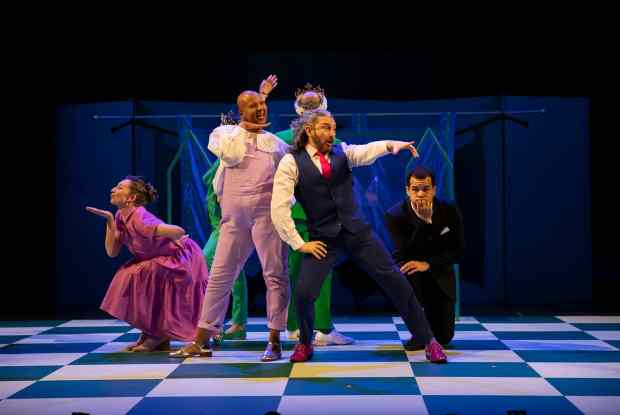Ian McKellen’s Hamlet is the highlight of Edinburgh’s opening week. In this experimental ballet, Sir Ian speaks roughly 5 per cent of the lines, accompanied by a hunky blond dancer, Johan Christensen, who offers a physical interpretation of the Dane’s melancholy. The other roles are played by a ballet troupe in olde worlde costumes. The performing area is a black thrust stage, gleaming like patent leather, surrounded by low spotlights and swirling dry ice. It looks like Elsinore recreated by a cruise-ship designer.
Newcomers will find the story mystifying. Hamlet smoulders longingly at Horatio and they dance like a hot couple at a gay night spot. The middle-aged Laertes seems to be the boss or perhaps the father of Ophelia who appears to be sharing a flat with a youthful Polonius. Rosencrantz and Guildenstern do a decent comedy turn as bickering siblings. One element, the death of Gonzago, is greatly improved by the dancing but much of the narrative has been dropped altogether which is frustrating for the play’s fans.
McKellen wears a microphone in this smallish theatre and he performs with little passion because his speeches are detached from the ballet, like museum exhibits. He spends most of his time ogling the muscular Christensen as he cavorts across every inch of the slippery-looking stage without falling once. Excellent work. During his pas de deux with Ophelia he hoiks her across his beefy shoulders and twirls her around the venue while she scissors her legs open and shut. That, perhaps, is a less satisfying portrait of doomed infatuation than Hamlet’s letter ‘Doubt thou the stars are fire…’
This is an interesting experiment, and an easy gig for McKellen, but it’s aimed at gay men, ballet fans, and people who quite like Hamlet but can’t be bothered to sit through it twice.
There are not one but two excellent Borises up here. Boris the Third revisits the PM’s legendary attempt to play the hunchbacked murderer in a production at Eton. Writer Adam Meggido has fleshed out the yarn with amusing details. The actress cast as Lady Anne is Boris’s girlfriend but during rehearsals she discovers that he’s having a fling with her sister. Meanwhile the sister’s outraged boyfriend wants to kick Boris to death. Cue a hilarious backstage farce as he tries to get through the performance while keeping the women on side and avoiding the crazed attacks of the vengeful cuckold. The ingenious script blends the past with the present and adds lots of teasing references to Boris’s career as the clownish king of Downing Street. The script also attempts to explore the psychology of the smitten women who forgive Boris for his constant philandering because they can’t help but adore him. Harry Kershaw’s effusive, debonair and extremely likeable performance is uncannily like the real teenage Boris.
Boris Live at Five is equally good but utterly different. Will Barton gives a big, broad circus performance rather than a detailed and subtle portrayal of his subject. The premise is that Boris has hired a fringe venue to prepare a new chat show but his guests have cancelled and he has to improvise an hour on stage without making too many gaffes. He apologises to Scotland for the potato famine and during a call on his mobile phone he describes Edinburgh as ‘like Chernobyl but with more of branches of Subway’. He refers to Sir Keir Starmer as ‘Starmer the embalmer’ and to Emmanuel Macron as ‘a French midget always shagging his mum’. Nicola Sturgeon is ‘the poison dwarf’. That got a big cheer from the mostly Scottish crowd. To satisfy his libido, he keeps a posh blonde hidden backstage and she services him during the interval. He tugs off his trousers while reciting Churchill’s ‘fight them on the beaches’ speech and the blonde squeals back: ‘Shoot your hot cannon into me, animal.’ Not sophisticated but hilarious.
A third Boris is heard in ASSISTED, a new drama about a domestic robot, Alivia, whose owner asks her to impersonate her least favourite politician. ‘I believed implicitly that this was a work event,’ quotes Alivia, in an electronic voice. Alivia is the brainchild of a millionaire whizzkid, Jordan, who wants to transform his real-life girlfriend, Connie, into a slave who can cook, provide sex, and knock out a few babies as well. Connie rebels against this monstrous scheme and Alivia tries to help by asking Connie why she stays with her gruesome boyfriend. ‘Hope,’ says Connie. An answer that will resonate with anyone who has faced emotional bullying at home. This weighty and entertaining drama about control-freakery is highly recommended.
What the Heart Wants opens as a homage to Woody Allen which recycles the ‘ghostly apparition’ device from Play It Again, Sam. The visitor in this case is not Humphrey Bogart but Frank Sinatra, a former husband of Mia Farrow, who shows up at Woody’s New York apartment intending to beat him up because of his affair with Soon-Yi Previn. Woody talks Frank out of it and they agree to collaborate on a movie script about their amazing lives. This is more than just a delicious light-as-air comedy, it’s a serious work of investigative biography too. Richard Shelton plays Sinatra expertly and he belts out a couple of crowd-pleasing numbers as well. And it’s astonishing to see Simon Schatzberger as the nervy, garrulous and sublimely inventive film-maker. It’s almost miraculous. This could be the real Woody.
Got something to add? Join the discussion and comment below.
Get 10 issues for just $10
Subscribe to The Spectator Australia today for the next 10 magazine issues, plus full online access, for just $10.
You might disagree with half of it, but you’ll enjoy reading all of it. Try your first month for free, then just $2 a week for the remainder of your first year.














Comments
Don't miss out
Join the conversation with other Spectator Australia readers. Subscribe to leave a comment.
SUBSCRIBEAlready a subscriber? Log in